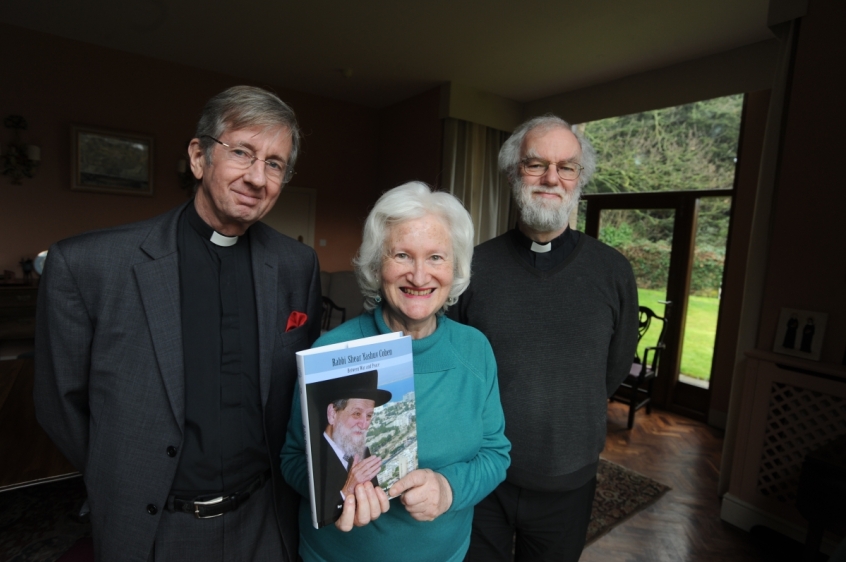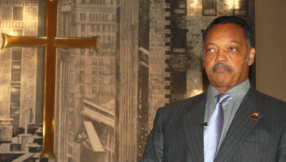
Best known, perhaps, as the former Chief Rabbi of Haifa for over 30 years, Shear Yashuv Cohen, who died last year, had an extraordinary number of roles that marked a life whose history is intertwined with that of the State of Israel itself.
Rabbis and Orthodox Jews are not renowned for their fighting, but as the Israeli Prime Minister Benjamin Netanyahu has said, Rabbi Cohen's was a life that combined 'the book and the sword'.
Born in 1927, the rabbi fought in the 1948 War of Independence to defend the Old City of Jerusalem, when he was severely wounded and taken to Jordan as a prisoner of war.
The Torah scholar went on to be the holy city's deputy mayor, president of the Harry Fischel Institute for Research in Talmud and Jewish Law, founder and president of the Ariel Institute and Chief Rabbi of the Israeli Air Force.
During the British mandate before 1948, Cohen had served as a member of the Jewish 'Underground' movement.
But as Dr Irene Lancaster, the translator of a new biography of Rabbi Cohen says in her introduction, he 'lived all his life preparing for War, while genuinely seeking Peace'.
The book, Rabbi Shear Yashuv Cohen: Between War and Peace by Yechiel Frish and Yedidya HaCohen, is in large part about the struggle for the Old City between 1947-'48, in which Rabbi Cohen was one of the leading combatants. But the work, which includes exerpts of Rabbi Cohen's private diary, is also, as Lancaster says, about the State of Israel itself.
The biography was launched earlier this month at Magdalene College, Cambridge, the Master of which is Rowan Williams, the former Archbishop of Canterbury who hosted and spoke at the launch.
The event marked a high-point in Anglican-Jewish relations which sometimes have been strained and tested over the decades.
As well as his many Israeli roles, Rabbi Cohen was also a leading rabbinic representative for inter-religious dialogue, first with the Catholic Church and, more latterly, with the Church of England.
As Dr Lancaster says, when she was invited around to the rabbi's home in Haifa in 2006 for Shabbat, he asked her: 'What do you know about the Church of England?' She adds: 'We never looked back.'
Canon Guy Wilkinson, the former interfaith advisor to Dr Williams' who worked at Lambeth Palace and is credited with improving Anglican-Jewish relations, played a key role in the production of the book along with Dr Lancaster.
Wilkinson helped Dr Williams initiate and develop a formal dialogue between the Archbishop and the Chief Rabbinate of Israel involving regular meetings on a range of issues including the dignity of life, environmental matters and the place of Jerusalem in Christianity and Judaism. A subsequent commission was led on the Israeli side by Rabbi Cohen.
'So I got to know him and he was already heavily engaged with a similar relationship with the Vatican,' Wilkinson tells Christian Today. 'So we were able through his good offices and through a meeting he had with Dr Lancaster to agree on a dialogue that continues to this day.'
On Rabbi Cohen, Wilkinson says: 'Here was a man who grew up and was formed in the context of the formation of the State of Israel in 1948 – that crucial time in Israel's history – and then continued through the various wars and violences of that whole situation.
'You might think that such a person, steeped in Orthodox Judaism, might have been not at all interested in engaging with the Christian world – particularly the Anglican Communion and the Vatican. That he did so I think says something deeply important both about him and about the opportunities for inter religious engagement. He exemplifies a real possibility and a real hope for the world in which we live, in which so often religious people don't want to have anything to do with each other.'
Above all, however, the rabbi will be remembered in Israel, as a leading figure in and after the State's foundation. As Netanyahu said of Rabbi Cohen after his death last year, just before the completion of this book: 'Rabbi Shear Yashuv Cohen was a great and wise man who always strove for the unity of the Jewish People, just as he worked to bring together various sectors of the population in Haifa, where he served as Chief Rabbi for over thirty years.
'Rabbi Cohen was a gracious and friendly person...who combined his Torah learning with acts of loving-kindness...He left behind him many...students, disciples, and friends for whom he was a spiritual leader and authority in Jewish law, as well as many profound and fascinating stories that will continue to remind us of his legacy for generations to come. May his memory be blessed.'
Rabbi Shear Yashuv Cohen: Between War and Peace by Yechiel Frish and Yedidya HaCohen is published by Urim Publications, priced $39.95. ISBN 978-965-524-253-9













